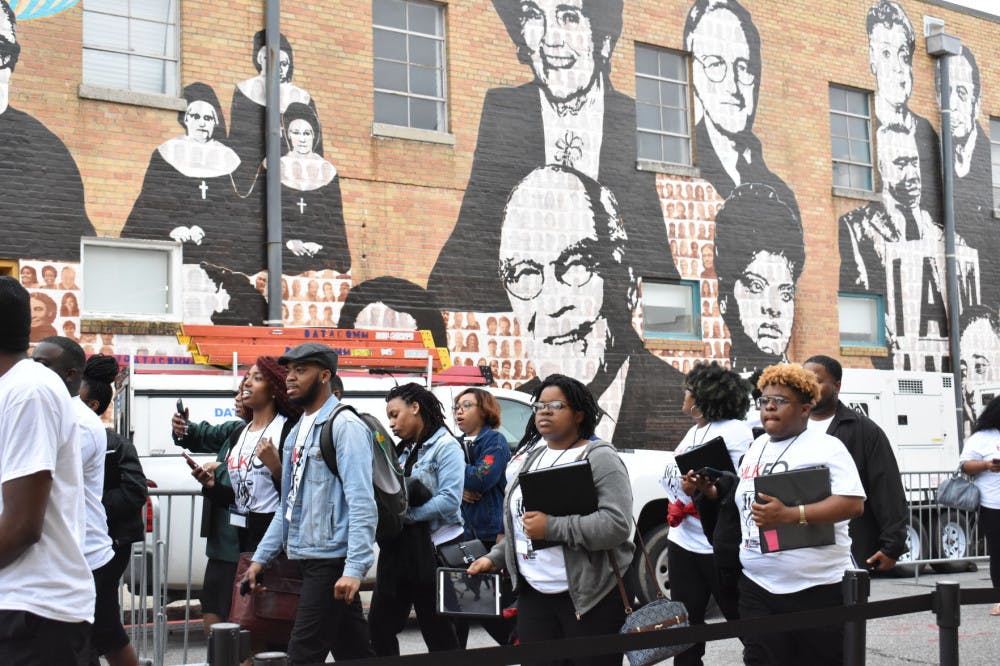The 50-year anniversary of the assassination of Martin Luther King Jr. happens officially on April 4 at 6:01 p.m., attracting a worldwide wave of spectators to the Bluff City.
Many tourists have come in long before April 4 to verse themselves in Memphis history and culture and enjoy a few pre-MLK50 events before commemorating the assassination. For many Memphians, the anniversary further connects and teaches them about their city, its history and the legacy left behind by King and his dream.
Just one day before the anniversary, Downtown Memphis became an area sprawling with commotion and construction in preparation for MLK50. Many tourists and Memphians alike have already enjoyed a few of the events and showcases leading up to April 4 and shared their thoughts on MLK50, King and his legacy.
Chris Preitauer, 48, San Diego
“In my opinion, Dr. King is the greatest American we have ever produced since the inception of the country, and I couldn’t miss it (MLK50). The importance is to give honor where honor is due, and to be frank, I don’t know why every hotel and every motel has not filled to capacity for the entire city. There should be traffic jams from people all over the country coming to Memphis to pay their respects.
“There are definitely people around the world that recognize that Dr. King is just an incredibly important contribution to world thought, world culture. I think it’s very difficult to say just how much of an impact Dr. King made.
“(For) a lot of people like me growing up in the white community, there was a perception of, ‘Oh, what a great thing Dr. King did for black people,’ and what I realized and what Dr. King explicitly said was that white people are damaged, their psyche is damaged when they hold beliefs of hatred. How many generations of white people grew up not being able to fully communicate and serve their God because their minds were polluted with not being their brother’s keeper, not loving their neighbor and all the while sitting in churches singing, ‘Amazing grace, how sweet the sound,’ and literally lived and died without the fullness of who they could have been as even white people because of that filth that was in their hearts? That’s the kind of thing Dr. King did for white people.
“I see Dr. King as the greatest thing for white people that there ever was because he set us free. It wasn’t just about black people getting the right the vote or sitting at segregated lunch counters, it was about people like myself not having to grow up hating other people.”
Caleb Triplett, 23, Memphis
“Being from Memphis, you get a more in-depth feeling and a more in-depth awareness of the history that’s behind the Civil Rights Museum and the Lorraine Motel. It’s pretty overwhelming. I honestly don’t think it’s going to hit me until tomorrow.”
Tyrone V. Allen, 70, Detroit
“I was obviously alive in 1968 when he was assassinated, and there’s a lot of controversy surrounding his assassination now. It’s part of our history and unfortunately since I’ve been here … I think a lot of what takes place now is just based on tradition. People don’t really understand the true gravity of what happened that day.
“Obviously, there was a lot of anger. I was actually in the military, and I had just came back from Vietnam the year before, and to know that we were halfway around the world fighting for somebody else’s freedom when we had not attained our own freedom right here in this country and to this day we still haven’t.
“Now it seems to be more of a cultural thing just to say, ‘I commemorated Dr. King’s death.’ It’s what I expect to see, but I would like to see more education around the whole occurrence.
“It’s almost like a festive type of atmosphere, and for us that remember it … it was a very sober occasion. We still think of it in those terms.
“What it (MLK's death) should do is galvanize us as a people to understand what Dr. King’s message really was and to pick up the banner and to carry it forward.”
Leslie Ann Harris, 30, Memphis
“I feel really privileged to be in this city at this time with the 50-year anniversary, and for us the ability to have a physical representation for my kids — who are black and I’m white — it’s a teachful moment.
“Martin Luther King did not get the attention and accolades he deserved in his time, but I feel like he’s seeing this now.”
Students from different HBCUs formed a choir in front of the Upstanders Mural for the MLK50 commemoration. This mural was created to honor other Memphis civil rights activists who made changes in their time.
Students from different HBCUs formed mass choir for the MLK50 commemoration on April 4. Like many Memphians and tourists, the HBCU students spent much of April 3 exploring the city and learning about the legacy of Dr. King.
The National Civil Rights Museum was still prepping for the 50-year anniversary of Dr. Martin Luther King's assassination on April 3. The commemoration will began 10 am on April 4.
Clayborn Temple was a center of organization and planning for Civil Rights activists and laborers during the 1968 Sanitation Strike. The church will now stand next to the new 'I AM A MAN' plaza which honors these events. Clayborn Temple and the plaza are located at 294 Hernando St, Memphis, TN 38126.
The long-anticipated 'I AM A MAN' Plaza is said to open in time for the MLK50 Commemoration. The plaza (located next to Clayborn Temple) will honor Dr. Martin Luther King's influence on the Civil Rights Movement as well as the 1968 Sanitation Strike.




